Related Research Articles

Charles-Maurice de Talleyrand-Périgord, 1st Prince of Benevento, then Prince of Talleyrand, was a French secularised clergyman, statesman and leading diplomat. After studying theology, he became Agent-General of the Clergy in 1780. In 1789, just before the French Revolution, he became Bishop of Autun. He worked at the highest levels of successive French governments, most commonly as foreign minister or in some other diplomatic capacity. His career spanned the regimes of Louis XVI, the years of the French Revolution, Napoleon, Louis XVIII, and Louis Philippe I. Those Talleyrand served often distrusted him but, like Napoleon, found him extremely useful. The name "Talleyrand" has become a byword for crafty, cynical diplomacy.
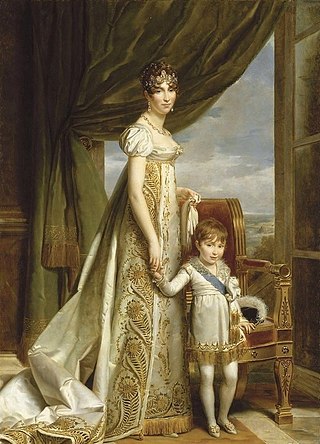
Hortense Eugénie Cécile Bonaparte was Queen consort of Holland. She was the stepdaughter of Emperor Napoléon I as the daughter of his first wife, Joséphine de Beauharnais. Hortense later married Napoléon I’s brother, Louis Bonaparte, who had been made King of Holland, making her her stepfather’s sister-in-law. She was the mother of Napoléon III, Emperor of the French; Louis II of Holland; and Napoléon Louis Charles Bonaparte who died at the age of four. She also had an illegitimate son, Charles, Duke of Morny, with her lover, the Comte de Flahaut.

Maxime Weygand was a French military commander in World War I and World War II, as well as a high ranking member of the Vichy regime.
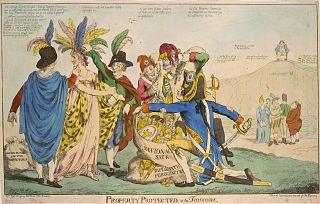
The XYZ Affair was a political and diplomatic episode in 1797 and 1798, early in the presidency of John Adams, involving a confrontation between the United States and Republican France that led to the Quasi-War. The name derives from the substitution of the letters X, Y, and Z for the names of French diplomats Jean-Conrad Hottinguer (X), Pierre Bellamy (Y), and Lucien Hauteval (Z) in documents released by the Adams administration.
A libertine is a person devoid of most moral principles, a sense of responsibility, or sexual restraints, who sees these traits as unnecessary or undesirable, and is especially someone who ignores or even spurns accepted morals and forms of behaviour observed by the larger society. The values and practices of libertines are known collectively as libertinism or libertinage and are described as an extreme form of hedonism. Libertines put value on physical pleasures, meaning those experienced through the senses. As a philosophy, libertinism gained new-found adherents in the 17th, 18th, and 19th centuries, particularly in France and Great Britain. Notable among these were John Wilmot, 2nd Earl of Rochester, and the Marquis de Sade.
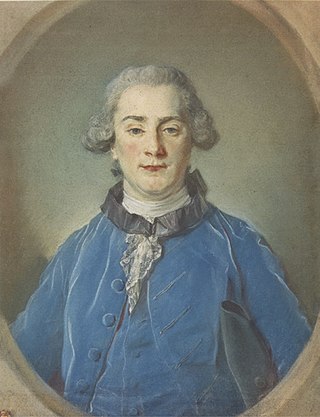
Theophilus Cazenove, or Theophile Cazenove, was a Dutch financier and one of the agents of the Holland Land Company.

Hélie de Talleyrand-Périgord was a French Cardinal, from one of the most aristocratic families in Périgord, south-west France. Hélie was born at Périgueux, third son of Elias VII, Count of Périgord, and Brunissende of Foix, daughter of Roger Bernard III, comte de Foix. His elder brothers were Archambaud (IV), who inherited the County, and Roger-Bernard ; his younger brother was Fortanier, and his sisters were Agnes, Jeanne, Marguerite, and Rosemburge. As a third son Hélie was destined for an ecclesiastical career. His brother, Roger Bernard, too, had an ecclesiastical career, becoming Canon of Lyon. But then, the eldest son died, and Roger-Bernard became the Count of Périgord. Hélie became a major figure in the Avignon papacy, and also a diplomat engaged in the negotiations of the Hundred Years' War, having friendships in both English and French royal families. In his last months he had been appointed Papal Legate for a crusade against the Turks.
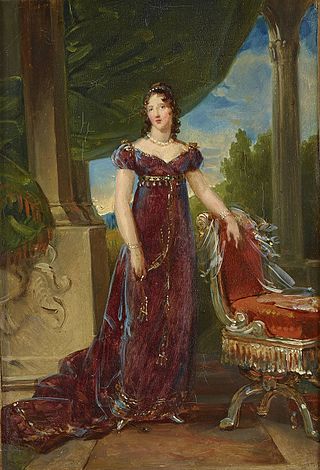
Dorothea von Biron, Princess of Courland, Duchess of Dino, Duchess of Talleyrand and Duchess of Sagan, known as Dorothée de Courlande or Dorothée de Dino, was a Baltic German noblewoman, and the ruling Duchess of Sagan between 1845 and 1862. Her mother was Dorothea von Medem, Duchess of Courland, and although her mother's husband, Duke Peter von Biron, acknowledged her as his own, her true father may have been the Polish statesman Count Aleksander Batowski. For a long time, she accompanied the French statesman Charles Maurice de Talleyrand-Périgord; she was the separated wife of his nephew, Edmond de Talleyrand-Périgord.

Esprit Victor Elisabeth Boniface de Castellane, comte de Castellane, was a French military officer and ultimately a Marshal of France.
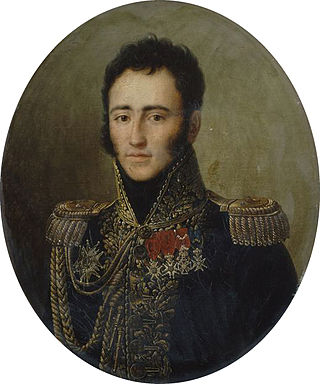
Edmond de Talleyrand-Périgord, 2nd Duke of Talleyrand, 2nd Duke of Dino, was a French general of the Napoleonic Wars.

Charles Guillaume Frédéric Boson de Talleyrand-Périgord, prince of Sagan, duke of Sagan and duke of Talleyrand was a famous French dandy, and the grandson of Dorothea von Biron.
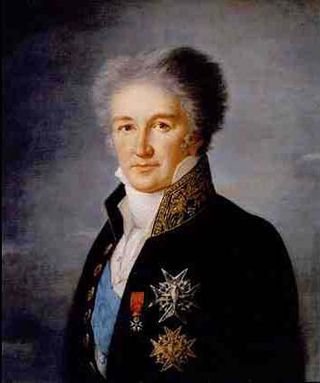
Charles François de Riffardeau, marquis, then duc de Rivière was French ambassador to the Sublime Porte of the Ottoman Empire, 1815–1821, for which service he was made duc in 1825. He played a role in getting the Venus de Milo for the Musée du Louvre.
Antoine René Charles Mathurin, comte de Laforêt was a senior French diplomat. He was Consul General of France to the United States before the French Revolution. During the First French Empire he was Ambassador in Madrid. He was briefly Minister of Foreign Affairs during the transitional government after the fall of Napoleon in 1814, and in 1815, after second abdication of Napoleon, a plenipotentiary to the Seventh Coalition powers.

Jean Paul Adam, comte de Schramm was a French Minister of War.

Charles Alain de Rohan was a French nobleman and Prince of Guéméné. He died without any surviving descendants as his daughter died without children.
Jean-François-Maxime Raybaud was a French philhellene officer and writer, and a participant in the War of Independence of Greece.
The First ministry of Louis-Philippe was announced on 11 August 1830 by King Louis Philippe I two days after he had become king. It replaced the Provisional Ministry announced on 1 August 1830. On 2 November 1830 it was replaced by the Cabinet of Jacques Laffitte.
Calmann-Lévy is a French publishing house founded in 1836 by Michel Lévy as Michel Lévy frères. His brother Kalmus Calmann Lévy joined in 1844, and the firm was renamed Calmann Lévy in 1875 after Michel's death.

Napoléon-Louis de Talleyrand-Périgord, duc de Valençay, 3rd duc de Talleyrand-Périgord was a French aristocrat, soldier and politician.
Le souper is a 1992 French period drama film directed by Édouard Molinaro. Based on a stage play by Jean-Claude Brisville, the film imagines the negotiations over supper about a new government for France after the Battle of Waterloo in 1815 and who will get the top jobs.
References
- ↑ Monsieur de Talleyrand .. : Villemarest, Charles Maxime Catherinet de, 1785-1852 : Free Download & Streaming : Internet Archive
- ↑ Smith, William H. C. (2007-01-20). The Bonapartes: The History of a Dynasty. Continuum International. p. 5. ISBN 9781852855789.
- ↑ Christopher, Thomas (2002). In Search of Lost Roses. University of Chicago Press. p. 95.